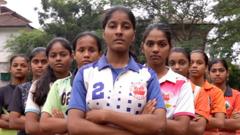**The recently launched series "Waack Girls" not only showcases the vibrant art of waacking but serves as a cultural bridge, connecting India's youth with its rich history of self-expression and dance.**
**Reviving Waacking: India Embraces the Dance Style from the 70s LGBTQ+ Movement**

**Reviving Waacking: India Embraces the Dance Style from the 70s LGBTQ+ Movement**
**A New Web Series Sparks Interest in a Dance Form Rooted in Self-Expression and Empowerment**
A bright spotlight illuminates a woman moving gracefully on stage, her glittering dress shimmering alongside her dynamic movements. This captivating scene marks the beginning of "Waack Girls," a new series on Amazon Prime Video that revolves around six women striving to form India's first all-female waacking troupe.
While many remain unfamiliar with the dance genre, the women must confront societal expectations and familial pressures while embarking on their journey. Directed by Sooni Taraporevala, "Waack Girls" emerges at a pivotal moment as waacking is rapidly gaining traction in Indian cities, big and small.
"I was captivated by the essence of waacking and its role in portraying individuality," Taraporevala explains regarding her motivation for the show. As underground waacking battles and workshops spring up across the country, renowned waacking legends, including Archie Burnett from New York's vibrant 70s club scene, are making their way to India to share their expertise.
Dancers hope the series will amplify waacking's visibility in India, proving that there exists a rich tapestry of dance beyond the realms of classical, Bollywood, and hip-hop. Originating in Los Angeles's gay clubs during the 1970s amid a backdrop of social stigma and discrimination, waacking symbolizes empowerment and self-expression—a legacy that resonates with India's burgeoning LGBTQ+ community.
The term "waacking" itself derives from the onomatopoeic word 'whack,' evoking imagery akin to comic book action scenes filled with explosive movements while incorporating elements from Hollywood's glamorous leading ladies.
Tejasvi Patil, a prominent Mumbai dancer with a decade of experience, notes, "Waacking is about individual expression and has become a way for individuals to explore their own sexual identities." Ayushi Amrute echoes this sentiment, emphasizing the importance of cultivating safe spaces for self-exploration through dance.
When Amrute first discovered waacking, its presence in India was minimal as she and others diligently worked to educate themselves through research and connections with international dancers. The landscape has transformed significantly in recent years, with increasing young people engaging in waacking classes.
While Patil emphasizes the originality in music choices for waacking in India, classic tracks from disco legends still remain popular. For "Waack Girls," Taraporevala collaborates with indie musicians to curate a distinct soundtrack, resonating with the dance's ethos.
"I genuinely believe it's time for people to embrace their true selves," concludes Patil, "and waacking provides the ideal canvas to express what one discovers within."





















